流感用英语怎么说
- 格式:doc
- 大小:20.00 KB
- 文档页数:3
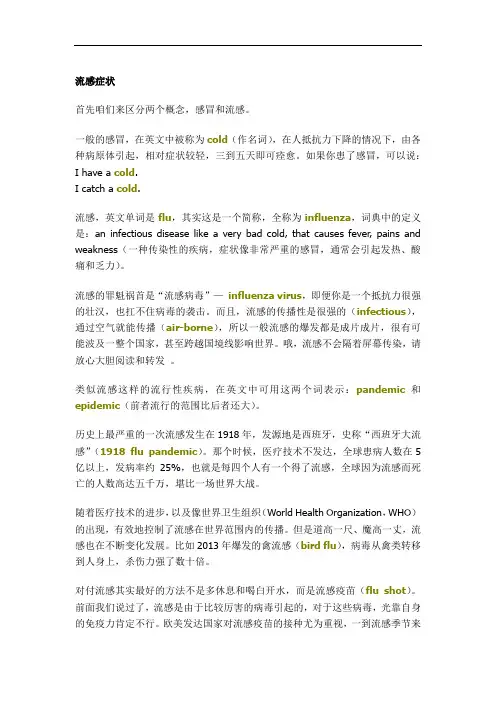
流感症状首先咱们来区分两个概念,感冒和流感。
一般的感冒,在英文中被称为cold(作名词),在人抵抗力下降的情况下,由各种病原体引起,相对症状较轻,三到五天即可痊愈。
如果你患了感冒,可以说:I have a cold.I catch a cold.流感,英文单词是flu,其实这是一个简称,全称为influenza,词典中的定义是:an infectious disease like a very bad cold, that causes fever, pains and weakness(一种传染性的疾病,症状像非常严重的感冒,通常会引起发热、酸痛和乏力)。
流感的罪魁祸首是“流感病毒”—influenza virus,即便你是一个抵抗力很强的壮汉,也扛不住病毒的袭击。
而且,流感的传播性是很强的(infectious),通过空气就能传播(air-borne),所以一般流感的爆发都是成片成片,很有可能波及一整个国家,甚至跨越国境线影响世界。
哦,流感不会隔着屏幕传染,请放心大胆阅读和转发。
类似流感这样的流行性疾病,在英文中可用这两个词表示:pandemic和epidemic(前者流行的范围比后者还大)。
历史上最严重的一次流感发生在1918年,发源地是西班牙,史称“西班牙大流感”(1918 flu pandemic)。
那个时候,医疗技术不发达,全球患病人数在5亿以上,发病率约25%,也就是每四个人有一个得了流感,全球因为流感而死亡的人数高达五千万,堪比一场世界大战。
随着医疗技术的进步,以及像世界卫生组织(World Health Organization,WHO)的出现,有效地控制了流感在世界范围内的传播。
但是道高一尺、魔高一丈,流感也在不断变化发展。
比如2013年爆发的禽流感(bird flu),病毒从禽类转移到人身上,杀伤力强了数十倍。
对付流感其实最好的方法不是多休息和喝白开水,而是流感疫苗(flu shot)。
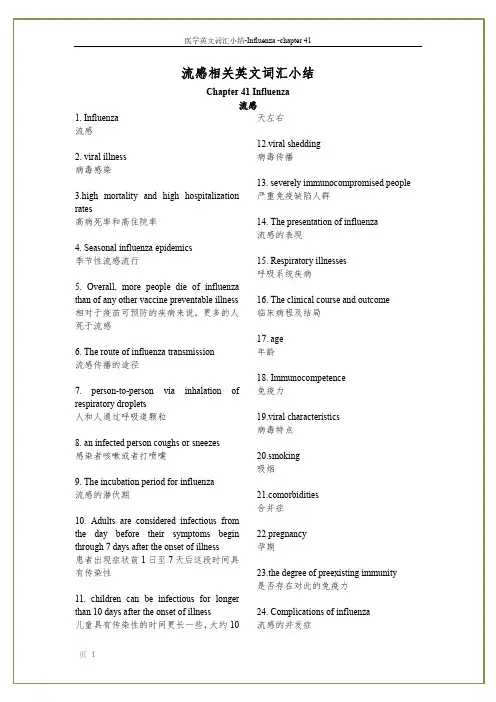
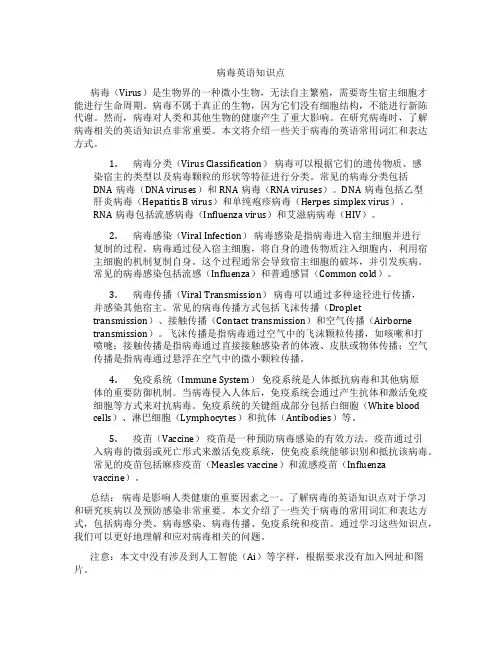
病毒英语知识点病毒(Virus)是生物界的一种微小生物,无法自主繁殖,需要寄生宿主细胞才能进行生命周期。
病毒不属于真正的生物,因为它们没有细胞结构,不能进行新陈代谢。
然而,病毒对人类和其他生物的健康产生了重大影响。
在研究病毒时,了解病毒相关的英语知识点非常重要。
本文将介绍一些关于病毒的英语常用词汇和表达方式。
1.病毒分类(Virus Classification)病毒可以根据它们的遗传物质、感染宿主的类型以及病毒颗粒的形状等特征进行分类。
常见的病毒分类包括DNA病毒(DNA viruses)和RNA病毒(RNA viruses)。
DNA病毒包括乙型肝炎病毒(Hepatitis B virus)和单纯疱疹病毒(Herpes simplex virus)。
RNA病毒包括流感病毒(Influenza virus)和艾滋病病毒(HIV)。
2.病毒感染(Viral Infection)病毒感染是指病毒进入宿主细胞并进行复制的过程。
病毒通过侵入宿主细胞,将自身的遗传物质注入细胞内,利用宿主细胞的机制复制自身。
这个过程通常会导致宿主细胞的破坏,并引发疾病。
常见的病毒感染包括流感(Influenza)和普通感冒(Common cold)。
3.病毒传播(Viral Transmission)病毒可以通过多种途径进行传播,并感染其他宿主。
常见的病毒传播方式包括飞沫传播(Droplettransmission)、接触传播(Contact transmission)和空气传播(Airbornetransmission)。
飞沫传播是指病毒通过空气中的飞沫颗粒传播,如咳嗽和打喷嚏;接触传播是指病毒通过直接接触感染者的体液、皮肤或物体传播;空气传播是指病毒通过悬浮在空气中的微小颗粒传播。
4.免疫系统(Immune System)免疫系统是人体抵抗病毒和其他病原体的重要防御机制。
当病毒侵入人体后,免疫系统会通过产生抗体和激活免疫细胞等方式来对抗病毒。

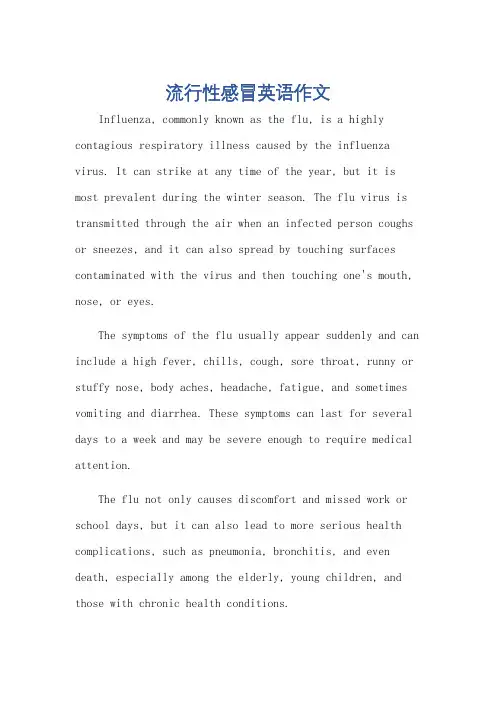
流行性感冒英语作文Influenza, commonly known as the flu, is a highly contagious respiratory illness caused by the influenza virus. It can strike at any time of the year, but it is most prevalent during the winter season. The flu virus is transmitted through the air when an infected person coughs or sneezes, and it can also spread by touching surfaces contaminated with the virus and then touching one's mouth, nose, or eyes.The symptoms of the flu usually appear suddenly and can include a high fever, chills, cough, sore throat, runny or stuffy nose, body aches, headache, fatigue, and sometimes vomiting and diarrhea. These symptoms can last for several days to a week and may be severe enough to require medical attention.The flu not only causes discomfort and missed work or school days, but it can also lead to more serious health complications, such as pneumonia, bronchitis, and even death, especially among the elderly, young children, and those with chronic health conditions.Fortunately, there are several ways to prevent the spread of the flu. The most effective way is to get vaccinated against the flu each year. The flu vaccine helps the body build immunity to the virus and can significantly reduce the risk of getting infected. Additionally,practicing good hygiene, such as washing hands frequently, covering the mouth and nose when coughing or sneezing, and avoiding touching one's face, can help prevent the spreadof the virus.It is also important to stay home and rest when feeling ill to prevent the spread of the flu to others. Drinking plenty of fluids, getting enough sleep, and eatingnutritious foods can help the body fight the infection.In conclusion, the flu is a serious respiratory illness that can have a significant impact on individuals and communities. By getting vaccinated, practicing good hygiene, and staying home when ill, we can help prevent the spreadof the flu and protect ourselves and our loved ones fromthis potentially deadly virus.**流行性感冒的影响与预防**流行性感冒,通常简称为流感,是一种由流感病毒引起的高度传染性疾病。
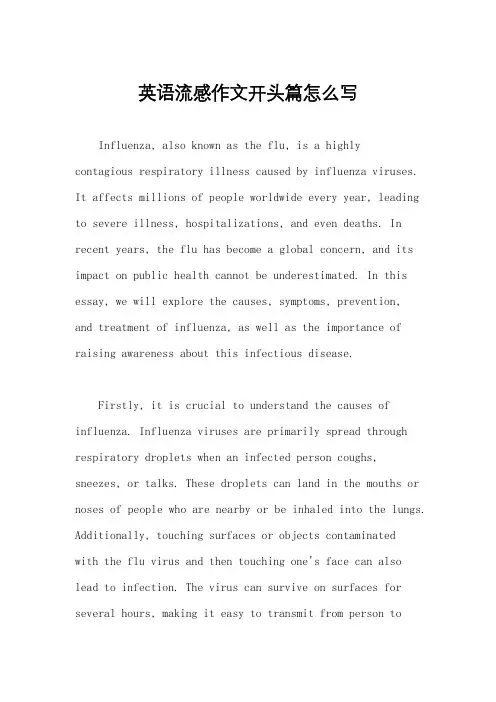
英语流感作文开头篇怎么写Influenza, also known as the flu, is a highlycontagious respiratory illness caused by influenza viruses. It affects millions of people worldwide every year, leading to severe illness, hospitalizations, and even deaths. In recent years, the flu has become a global concern, and its impact on public health cannot be underestimated. In this essay, we will explore the causes, symptoms, prevention,and treatment of influenza, as well as the importance of raising awareness about this infectious disease.Firstly, it is crucial to understand the causes of influenza. Influenza viruses are primarily spread through respiratory droplets when an infected person coughs, sneezes, or talks. These droplets can land in the mouths or noses of people who are nearby or be inhaled into the lungs. Additionally, touching surfaces or objects contaminatedwith the flu virus and then touching one's face can also lead to infection. The virus can survive on surfaces for several hours, making it easy to transmit from person toperson.The symptoms of the flu can vary from mild to severe and can include fever, cough, sore throat, runny or stuffy nose, body aches, headache, fatigue, and sometimes vomiting and diarrhea. These symptoms can appear suddenly and can be debilitating, causing individuals to miss work, school, and other daily activities. In severe cases, complications such as pneumonia can occur, especially in young children, older adults, pregnant women, and people with certain medical conditions.Prevention is key in reducing the spread of influenza. The most effective way to prevent the flu is by getting vaccinated annually. The flu vaccine is designed to protect against the most common strains of the virus and is recommended for everyone above the age of six months. Additionally, practicing good hand hygiene, such as washing hands frequently with soap and water or using hand sanitizer, can help prevent the spread of the virus. Avoiding close contact with sick individuals and staying home when feeling unwell are also essential in preventingthe transmission of the flu.In the case of influenza infection, early treatment is crucial to reduce the severity and duration of the illness. Antiviral medications, such as oseltamivir and zanamivir, can be prescribed by healthcare professionals to treat the flu. These medications work best when taken within 48 hours of the onset of symptoms. Rest, hydration, and over-the-counter pain relievers can also help alleviate symptoms and aid in recovery.Raising awareness about influenza is vital in combating the spread of the virus. Educational campaigns should be conducted to inform the public about the importance of vaccination, hand hygiene, and staying home when sick. Schools, workplaces, and healthcare facilities should implement policies that encourage individuals to take preventive measures and seek medical attention when necessary. By increasing awareness and promoting responsible behavior, we can collectively reduce the impact of influenza on our communities.In conclusion, influenza is a significant public health concern that affects millions of people worldwide each year. Understanding the causes, symptoms, prevention, and treatment of the flu is crucial in combating its spread. By practicing good hygiene, getting vaccinated, and raising awareness, we can protect ourselves and others from this highly contagious respiratory illness. Let us work together to prevent the flu and promote a healthier future for all.。
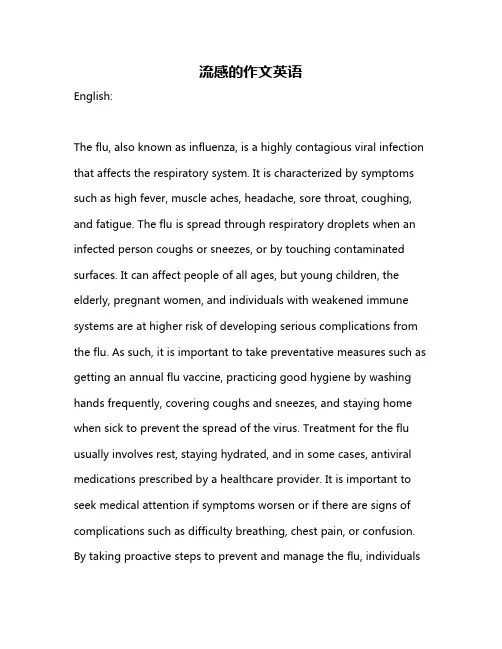
流感的作文英语English:The flu, also known as influenza, is a highly contagious viral infection that affects the respiratory system. It is characterized by symptoms such as high fever, muscle aches, headache, sore throat, coughing, and fatigue. The flu is spread through respiratory droplets when an infected person coughs or sneezes, or by touching contaminated surfaces. It can affect people of all ages, but young children, the elderly, pregnant women, and individuals with weakened immune systems are at higher risk of developing serious complications from the flu. As such, it is important to take preventative measures such as getting an annual flu vaccine, practicing good hygiene by washing hands frequently, covering coughs and sneezes, and staying home when sick to prevent the spread of the virus. Treatment for the flu usually involves rest, staying hydrated, and in some cases, antiviral medications prescribed by a healthcare provider. It is important to seek medical attention if symptoms worsen or if there are signs of complications such as difficulty breathing, chest pain, or confusion. By taking proactive steps to prevent and manage the flu, individualscan reduce the risk of illness and protect themselves and others from this common respiratory infection.中文翻译:流感,又称为流行性感冒,是一种高度传染性的病毒感染,会影响呼吸系统。
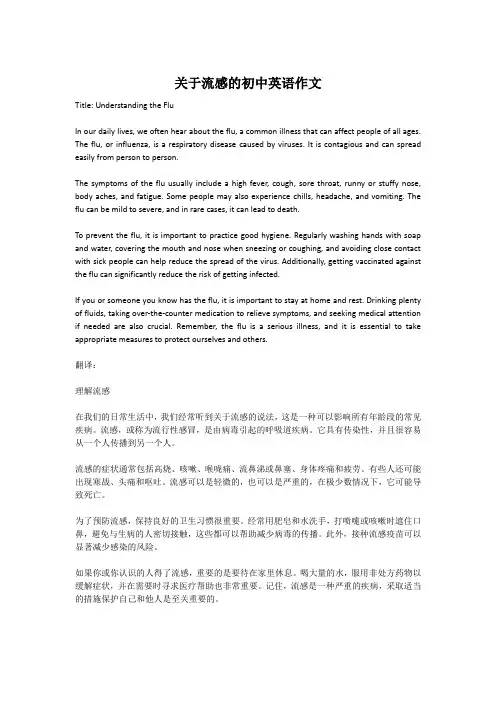
关于流感的初中英语作文Title: Understanding the FluIn our daily lives, we often hear about the flu, a common illness that can affect people of all ages. The flu, or influenza, is a respiratory disease caused by viruses. It is contagious and can spread easily from person to person.The symptoms of the flu usually include a high fever, cough, sore throat, runny or stuffy nose, body aches, and fatigue. Some people may also experience chills, headache, and vomiting. The flu can be mild to severe, and in rare cases, it can lead to death.To prevent the flu, it is important to practice good hygiene. Regularly washing hands with soap and water, covering the mouth and nose when sneezing or coughing, and avoiding close contact with sick people can help reduce the spread of the virus. Additionally, getting vaccinated against the flu can significantly reduce the risk of getting infected.If you or someone you know has the flu, it is important to stay at home and rest. Drinking plenty of fluids, taking over-the-counter medication to relieve symptoms, and seeking medical attention if needed are also crucial. Remember, the flu is a serious illness, and it is essential to take appropriate measures to protect ourselves and others.翻译:理解流感在我们的日常生活中,我们经常听到关于流感的说法,这是一种可以影响所有年龄段的常见疾病。
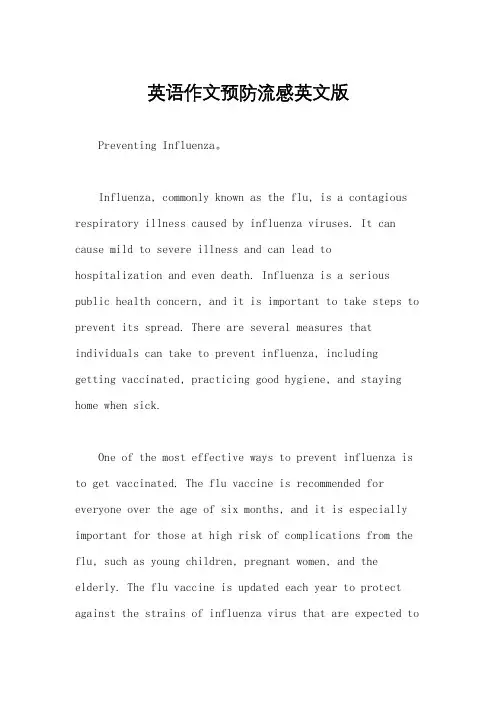
英语作文预防流感英文版Preventing Influenza。
Influenza, commonly known as the flu, is a contagious respiratory illness caused by influenza viruses. It can cause mild to severe illness and can lead tohospitalization and even death. Influenza is a serious public health concern, and it is important to take steps to prevent its spread. There are several measures that individuals can take to prevent influenza, includinggetting vaccinated, practicing good hygiene, and staying home when sick.One of the most effective ways to prevent influenza is to get vaccinated. The flu vaccine is recommended for everyone over the age of six months, and it is especially important for those at high risk of complications from the flu, such as young children, pregnant women, and the elderly. The flu vaccine is updated each year to protect against the strains of influenza virus that are expected tobe most common during the flu season. Getting vaccinated not only protects the individual who receives the vaccine but also helps to prevent the spread of influenza in the community.In addition to getting vaccinated, practicing good hygiene is essential for preventing influenza. This includes washing hands frequently with soap and water, especially after coughing or sneezing, and using hand sanitizer if soap and water are not available. It is also important to cover the mouth and nose with a tissue or the elbow when coughing or sneezing, and to avoid touching the face with unwashed hands. These simple measures can help to prevent the spread of influenza and other respiratory illnesses.Another important step in preventing influenza is to stay home when sick. If an individual is experiencing symptoms of the flu, such as fever, cough, sore throat, body aches, and fatigue, it is important to stay home from work, school, and other activities to prevent spreading the illness to others. In addition, it is important to seekmedical care if flu symptoms are severe or if there is concern about complications from the flu.In conclusion, preventing influenza is an important public health priority. Getting vaccinated, practicing good hygiene, and staying home when sick are all important measures for preventing the spread of influenza. By taking these steps, individuals can protect themselves and others from this serious respiratory illness.。
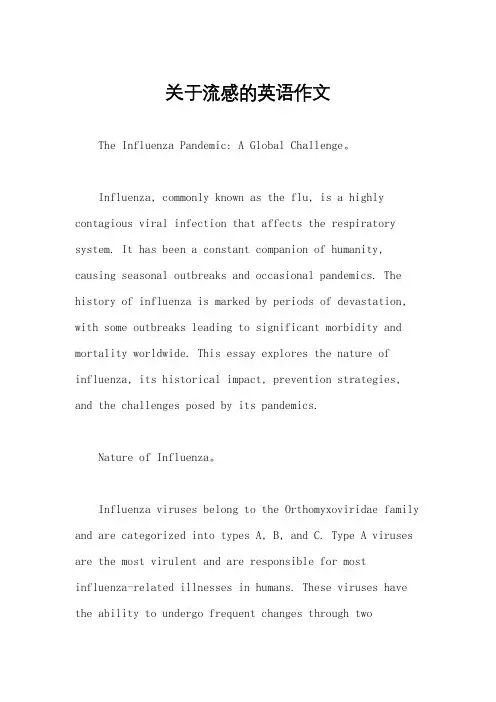
关于流感的英语作文The Influenza Pandemic: A Global Challenge。
Influenza, commonly known as the flu, is a highly contagious viral infection that affects the respiratory system. It has been a constant companion of humanity, causing seasonal outbreaks and occasional pandemics. The history of influenza is marked by periods of devastation, with some outbreaks leading to significant morbidity and mortality worldwide. This essay explores the nature of influenza, its historical impact, prevention strategies, and the challenges posed by its pandemics.Nature of Influenza。
Influenza viruses belong to the Orthomyxoviridae family and are categorized into types A, B, and C. Type A viruses are the most virulent and are responsible for most influenza-related illnesses in humans. These viruses have the ability to undergo frequent changes through twoprocesses: antigenic drift and antigenic shift. Antigenic drift refers to small changes in the virus that occur over time, while antigenic shift refers to major changes resulting from the reassortment of viral genetic material.The symptoms of influenza typically include fever, cough, sore throat, body aches, fatigue, and sometimes gastrointestinal issues. While most people recover from the flu without complications, it can lead to severe illness, especially in vulnerable populations such as the elderly, young children, and individuals with underlying health conditions.Historical Impact。
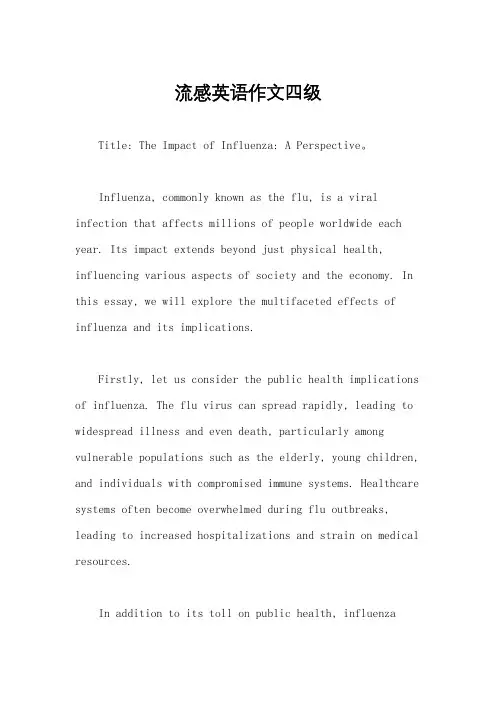
流感英语作文四级Title: The Impact of Influenza: A Perspective。
Influenza, commonly known as the flu, is a viral infection that affects millions of people worldwide each year. Its impact extends beyond just physical health, influencing various aspects of society and the economy. In this essay, we will explore the multifaceted effects of influenza and its implications.Firstly, let us consider the public health implications of influenza. The flu virus can spread rapidly, leading to widespread illness and even death, particularly among vulnerable populations such as the elderly, young children, and individuals with compromised immune systems. Healthcare systems often become overwhelmed during flu outbreaks, leading to increased hospitalizations and strain on medical resources.In addition to its toll on public health, influenzaalso has significant economic consequences. The costs associated with treating influenza-related illnesses, including hospitalizations, medications, and lost productivity, can be substantial. Moreover, outbreaks of influenza can disrupt business operations and reduce consumer spending, further impacting the economy.Furthermore, influenza outbreaks can have a profound effect on education. School closures are common during flu season to prevent the spread of the virus among students and staff. While necessary for public health, these closures can disrupt learning and create challenges for students, teachers, and parents alike.Moreover, influenza can also impact mental health and well-being. The fear and anxiety surrounding the spread of the virus can take a toll on individuals, leading to increased stress and uncertainty. Social isolation measures implemented during flu outbreaks can further exacerbate feelings of loneliness and depression.To mitigate the impact of influenza, vaccination playsa crucial role. Annual flu vaccines help prevent the spread of the virus and reduce the severity of illness for those who do become infected. However, vaccine hesitancy and misinformation can hinder vaccination efforts, making it challenging to achieve high levels of immunity within the population.In addition to vaccination, public health measures such as hand hygiene, respiratory etiquette, and social distancing can help prevent the spread of influenza. It is essential for individuals to take these precautions seriously, not only to protect themselves but also to safeguard the health of others in their communities.In conclusion, influenza is a significant public health concern with far-reaching implications. From its impact on physical health and the economy to its effects on education and mental well-being, influenza touches various aspects of society. By prioritizing vaccination and implementing preventive measures, we can work towards reducing the burden of influenza and building healthier, more resilient communities.。
患病的5种表达英语
1.Illness: “Illness”是指生病的一般状态。
该词适用于各种类型的疾病和病症,比如感冒、流感、癌症等等。
2.Sickness: “Sickness”与illness 大致相同,但它通常更强调病症的具体症状,比如头晕眼花、呕吐、腹泻等。
3.Disease: “Disease”指的是一类具有持续性或长期影响的疾病,如糖尿病、关节炎、高血压等。
该词也可指程度较轻的疾病或症状。
4.Ailment: “Ailment”通常指一些较轻微的病症,比如头痛、胃痛、咳嗽等,而且它所指的情况不一定需要医生的治疗。
5.Condition: “Condition”一般指一种身体或精神状态的状况,如健康状况、情绪状态等。
它可以涵盖某些特定的疾病或症状,比如心脏病、抑郁症等。
流感英语作文Influenza English Essay。
Influenza, commonly known as the flu, is a highly contagious respiratory illness caused by influenza viruses. It can affect anyone, regardless of age or health status, and can lead to serious complications such as pneumonia, bronchitis, and even death. In this essay, we will discuss the causes, symptoms, prevention, and treatment of influenza.Causes:Influenza viruses are highly contagious and can be spread through the air when an infected person coughs or sneezes. The virus can also be spread by touching a surface contaminated with the virus and then touching your mouth, nose, or eyes. There are three types of influenza viruses: A, B, and C. Influenza A viruses are the most common and can cause the most severe illness.Symptoms:The symptoms of influenza can vary from person to person, but generally include fever, cough, sore throat, runny or stuffy nose, body aches, headache, chills, and fatigue. In some cases, vomiting and diarrhea may also occur, especially in children. Symptoms usually appear 1-4 days after exposure to the virus and can last for several days to a week or more.Prevention:The best way to prevent influenza is to get vaccinated each year. The flu vaccine is recommended for everyone over the age of 6 months, especially those at high risk for complications such as young children, pregnant women, older adults, and people with certain medical conditions. Other ways to prevent influenza include practicing good hygiene, such as washing your hands frequently, covering your mouth and nose when coughing or sneezing, and avoiding close contact with sick people.Treatment:If you do get influenza, there are several things you can do to feel better and prevent complications. Rest and drink plenty of fluids to help your body fight the virus. Over-the-counter medications such as acetaminophen or ibuprofen can help relieve fever and body aches. Antiviral medications may also be prescribed by your doctor to help shorten the duration of the illness and prevent complications.In conclusion, influenza is a serious illness that can affect anyone. It is important to take steps to prevent the spread of the virus and to seek medical attention if you experience symptoms. Remember to get vaccinated each year and practice good hygiene to protect yourself and those around you. Stay healthy and stay safe!。
流感用英语怎么说
流感是流感病毒引起的急性呼吸道感染,也是一种传染性强、传播速度快的疾病。
其主要通过空气中的飞沫、人与人之间的接触或与被污染物品的接触传播。
那么你知道流感用英语怎么说吗?下面来学习一下吧。
流感英语说法1
influenza
流感语说法2
flu
流感的英语例句:
一场流感正席卷莫斯科。
A flu epidemic is sweeping through Moscow.
他得了流感病倒了。
He had come down with the flu.
每年都有新的流感病毒出现。
Every year new strains of influenza develop.
她患流感後非常虚弱。
The attack of flu left her feeling very groggy.
彼得明天不能参赛了,他得了流感。
Peter can't play tomorrow, he's (gone) down
with flu.
我患流感已在家休息一个星期了。
I've been laid up with flu for a week.
我得了流感,一星期没工作。
I got flu and was out of commission for a week.
我们昨晚都患了流感。
We all had influenza last night.
流感是一种传染病,其特征是发热、全身疼痛和疲乏无力。
Flu is an infectious disease characterized by fever, aches and pains and exhaustion.
我得了流感,不得不卧床休息。
I caught a flu and had to lie in the bed.
猪流感与季节性流感和禽流感有什么不同?
How is swine flu different than seasonal influenza and bird flu?
流感疫苗能帮你免患流感。
A flu vaccination can help to protect you from flu.
流感疫苗会否引致流感?
Does the vaccine cause influenza?
自从我得了流感以来,这段时间一直在下雪,大约每三天一场。
It has been snowing, roughly every third day, for as long as I've had the flu.
他患了严重的流感,尚未痊愈。
He was recovering from a severe bout of flu.
小心别让你孩子传上流感。
Mind that your children don't catch the flu.
这个乐队有3名成员得了流感。
Three members of the band went down with flu.
他得了西班牙流感,险些丧命。
He contracted Spanish flu, which almost killed him.
流感病毒有很多不同类型。
There are many different strains of flu virus.
我得了流感,一星期都卧病在床。
I spent a week in bed with flu.
随着欧洲债务危机正在向高速发展的新兴市场经济蔓延,始于欧洲的这场经济瘟疫正逐渐演变成一场世界范围内的“大流感”。
The European Economic contagion is threatening to become a worldwide flu as the financial turmoil spreads to the once high-flying emerging market economies.。